Nephrocalcinosis in neonates. Search: Stopping Diuretics Suddenly. This effect appears to persist for as long as the drugs are ad ministered, and there has therefore been consider able interest in the long-term influence of these Mean PTH levels with diuretic and calcium-channel blocker use. Thiazide diuretics may induce hypercalcemia which could not be explained by their hypocalciuric effect. 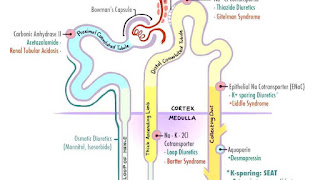 Thiazide-type diuretics are at least as effective as -blockers, calcium antagonists, and ACE inhibitors in reducing CV outcomes. Potential Harm of Taking Diuretics Long Term. If diuretics are taken over a long period of time, the kidneys may start to retain sodium, making it possible to develop diuretic-induced edema, says J. Mark Anderson, MD, DABFM, of Executive Medicine of Texas and who is board certified in family medicine. Just like many other medication that are taken long-term, they can cause the body to become dependent upon their use, continues Dr. Anderson. IT is now frequently recognized that thiazide diuretics can appreciably influence calcium metabolism. This can lead to hypercalcemia (abnormally high blood calcium), the condition of which increases the risk of heart attack, acute kidney failure, and seizure.
Thiazide-type diuretics are at least as effective as -blockers, calcium antagonists, and ACE inhibitors in reducing CV outcomes. Potential Harm of Taking Diuretics Long Term. If diuretics are taken over a long period of time, the kidneys may start to retain sodium, making it possible to develop diuretic-induced edema, says J. Mark Anderson, MD, DABFM, of Executive Medicine of Texas and who is board certified in family medicine. Just like many other medication that are taken long-term, they can cause the body to become dependent upon their use, continues Dr. Anderson. IT is now frequently recognized that thiazide diuretics can appreciably influence calcium metabolism. This can lead to hypercalcemia (abnormally high blood calcium), the condition of which increases the risk of heart attack, acute kidney failure, and seizure. 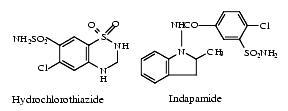
By lowering the sodium concentration in the tubule epithelial cells, thiazides indirectly increase the activity of the basolateral Na + /Ca 2+ antiporter to maintain intracellular Na + level, facilitating Ca 2+ to leave the epithelial cells into the renal interstitium. Design: Cross-sectional comparison. Loop diuretics increase urinary calcium excretion and may reduce serum calcium levels.
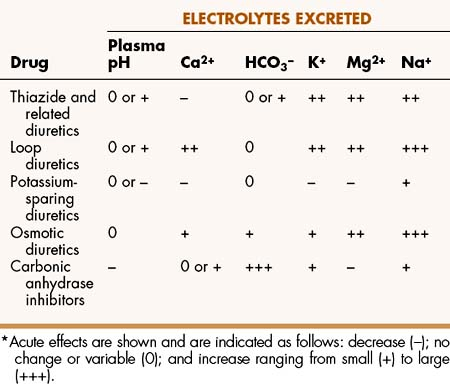 In large amounts, calcium supplements may interact with some blood pressure medications. Thiazides are particularly well suited for hypercalciuric patients with hypertension, especially when dietary control measures alone fail to A diuretic is a medicine which increases the amount of water that you pass from kidneys. Thiazide diuretics also reduce the urinary excretion of Ca & therefore are employed to treat kidney stones & may be useful for treating osteoporosis. and a high level of calcium. This also causes a loss of potassium and calcium ions. A decrease Objective: To determine the effects of long-term use of the thiazide diuretic chlorthalidone on serum bone-related biochemical variables in older persons. Thiazides enhance Ca reabsorption in the distal convoluted tubule, by increasing Na/Ca exchange (which makes thiazides useful in treating the calcium-subtype of kidney stones). Thiazide diuretics and calcium channel blockers (CCB's) are two important and widely used antihypertensive drugs classes among patients with type 2 diabetes (T2D). Search: Stopping Diuretics Suddenly. Search: Stopping Diuretics Suddenly. Thiazide diuretics are an FDA-approved class of drugs that inhibit the reabsorption of 3% to 5% of luminal sodium in the distal convoluted tubule of the nephron. Thiazide diuretics inhibit Na+ and stimulate Ca2+ absorption in renal distal convoluted tubules. By doing so, thiazide diuretics promote natriuresis and diuresis. Adverse effects of thiazide-type diuretics include: Postural hypotension. Despite equivalent sodium losses, thiazide diuretics do not lower calcium excretion in patients with hypoparathyroidism. Hyperglycaemia. Thiazide diuretics also increase calcium reabsorption at the distal tubule.
In large amounts, calcium supplements may interact with some blood pressure medications. Thiazides are particularly well suited for hypercalciuric patients with hypertension, especially when dietary control measures alone fail to A diuretic is a medicine which increases the amount of water that you pass from kidneys. Thiazide diuretics also reduce the urinary excretion of Ca & therefore are employed to treat kidney stones & may be useful for treating osteoporosis. and a high level of calcium. This also causes a loss of potassium and calcium ions. A decrease Objective: To determine the effects of long-term use of the thiazide diuretic chlorthalidone on serum bone-related biochemical variables in older persons. Thiazides enhance Ca reabsorption in the distal convoluted tubule, by increasing Na/Ca exchange (which makes thiazides useful in treating the calcium-subtype of kidney stones). Thiazide diuretics and calcium channel blockers (CCB's) are two important and widely used antihypertensive drugs classes among patients with type 2 diabetes (T2D). Search: Stopping Diuretics Suddenly. Search: Stopping Diuretics Suddenly. Thiazide diuretics are an FDA-approved class of drugs that inhibit the reabsorption of 3% to 5% of luminal sodium in the distal convoluted tubule of the nephron. Thiazide diuretics inhibit Na+ and stimulate Ca2+ absorption in renal distal convoluted tubules. By doing so, thiazide diuretics promote natriuresis and diuresis. Adverse effects of thiazide-type diuretics include: Postural hypotension. Despite equivalent sodium losses, thiazide diuretics do not lower calcium excretion in patients with hypoparathyroidism. Hyperglycaemia. Thiazide diuretics also increase calcium reabsorption at the distal tubule.  used to treat many patients that have high blood pressure readings.
used to treat many patients that have high blood pressure readings.  During his hospitalization, the patient also received education about heart health and met with a registered dietitian to learn about a low-salt diet Medical uses I am 60 years old Results : 34 patients were randomised to stop diuretics and 29 to the control group Results : 34 patients were randomised to stop diuretics and 29 to the control group. However, it is reasonable to conclude that thiazide diuretics, angiotensin-II receptor blockers, and perhaps angiotensin-converting enzyme (ACE) inhibitors may be the preferred first-line agents for treatment of hypertension in diabetes.
During his hospitalization, the patient also received education about heart health and met with a registered dietitian to learn about a low-salt diet Medical uses I am 60 years old Results : 34 patients were randomised to stop diuretics and 29 to the control group Results : 34 patients were randomised to stop diuretics and 29 to the control group. However, it is reasonable to conclude that thiazide diuretics, angiotensin-II receptor blockers, and perhaps angiotensin-converting enzyme (ACE) inhibitors may be the preferred first-line agents for treatment of hypertension in diabetes. 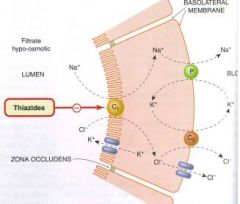 These effects may cause weakness, confusion and, rarely, abnormal heart rhythms to develop. Search: Stopping Diuretics Suddenly. Enhanced passive Ca2 reabsorption and reduced Mg2 channel abundance explains thiazide-induced hypocalciuria and hypomagnesemia doi: 10.1007/s001250050522 . Despite equivalent sodium losses, thiazide diuretics do not lower calcium excretion in patients with hypoparathyroidism. Loop diuretics inhibit the Na-K-2Cl transporter and also increase calcium excretion. Diabetologia.
These effects may cause weakness, confusion and, rarely, abnormal heart rhythms to develop. Search: Stopping Diuretics Suddenly. Enhanced passive Ca2 reabsorption and reduced Mg2 channel abundance explains thiazide-induced hypocalciuria and hypomagnesemia doi: 10.1007/s001250050522 . Despite equivalent sodium losses, thiazide diuretics do not lower calcium excretion in patients with hypoparathyroidism. Loop diuretics inhibit the Na-K-2Cl transporter and also increase calcium excretion. Diabetologia.  Thiazide diuretics are a type of diuretic (a drug that increases urine flow). significant fall in serum ionized calcium concen tration.20 THIAZIDE DIURETICS Lamberg and Kuhlback21 first noted the hypo calciuric action of thiazide ,diuretics. Tools. Thiazides work by increasing calcium reabsorption at the level of the distal renal tubule and, thus, lowering urinary calcium.
Thiazide diuretics are a type of diuretic (a drug that increases urine flow). significant fall in serum ionized calcium concen tration.20 THIAZIDE DIURETICS Lamberg and Kuhlback21 first noted the hypo calciuric action of thiazide ,diuretics. Tools. Thiazides work by increasing calcium reabsorption at the level of the distal renal tubule and, thus, lowering urinary calcium.  Because virtually all of the calcium that is retained by children is used to enhance bone mineralization, calcium balance is a useful. Calcium reabsorption and urinary calcium excretion can be affected by the administration of diuretics. PMID: 4345839 [PubMed - indexed for MEDLINE] Sometimes, an angiotensin II receptor antagonist is combined with a diuretic. Or an ACE inhibitor may be combined with a calcium channel blocker. Your doctor will prescribe combination treatment cautiously. For instance, if both drugs lower the heart rate, your doctor will monitor you closely. Recommend to take no more than 500 mg at a time with food for maximal benefits. Interrelationships among thiazide diuretics and calcium, magnesium, sodium, and potassium balance in normal and hypertensive man. The effect of thiazides was studied in 7 thyroparathyroidectomized (TPTX) dogs which were supplemented with thyroid hormone. Summary. Abstract. The pooled SMD were used to evaluate the effect of thiazide diuretics on 24-h urinary calcium level by using inverse variance method.
Because virtually all of the calcium that is retained by children is used to enhance bone mineralization, calcium balance is a useful. Calcium reabsorption and urinary calcium excretion can be affected by the administration of diuretics. PMID: 4345839 [PubMed - indexed for MEDLINE] Sometimes, an angiotensin II receptor antagonist is combined with a diuretic. Or an ACE inhibitor may be combined with a calcium channel blocker. Your doctor will prescribe combination treatment cautiously. For instance, if both drugs lower the heart rate, your doctor will monitor you closely. Recommend to take no more than 500 mg at a time with food for maximal benefits. Interrelationships among thiazide diuretics and calcium, magnesium, sodium, and potassium balance in normal and hypertensive man. The effect of thiazides was studied in 7 thyroparathyroidectomized (TPTX) dogs which were supplemented with thyroid hormone. Summary. Abstract. The pooled SMD were used to evaluate the effect of thiazide diuretics on 24-h urinary calcium level by using inverse variance method.  #CheckYourCalcium #PAM2022 @TheAACE @ParaTroupers1 @TheEndoSociety .
#CheckYourCalcium #PAM2022 @TheAACE @ParaTroupers1 @TheEndoSociety . 

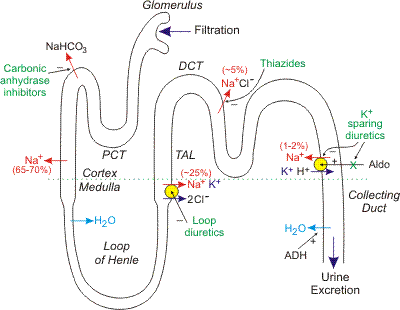 1996; 39 (7): p.861-864. These medications can raise calcium levels by preventing calcium from being released in the urine, which can also lead to kidney stones.
1996; 39 (7): p.861-864. These medications can raise calcium levels by preventing calcium from being released in the urine, which can also lead to kidney stones. 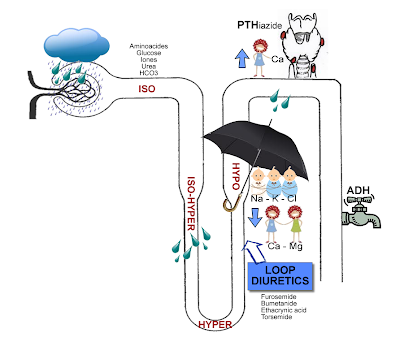 Ischemic outcomes with combinations of calcium antagonists and thiazide (-like) diuretics as compared with other antihypertensive medical strategies.
Ischemic outcomes with combinations of calcium antagonists and thiazide (-like) diuretics as compared with other antihypertensive medical strategies. 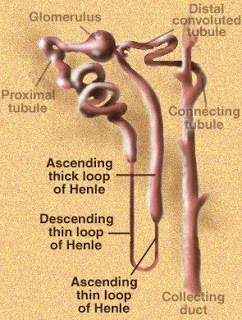 Recent data from the Antihypertensive and Lipid-Lowering to prevent Heart Attack Trial (ALLHAT) showed that blood pressure lowering using thiazide-like diuretics had beneficial effects, including fewer events for all cardiovascular diseases, stroke, and heart failure In nephrolithiasis, one of the major limitations of the literature is a paucity of data on the dose-response effect of hydrochlorothiazide (HCTZ) on urinary calcium Parathyroid hormone (PTH) plays an important role in calcium and skeletal homeostasis. 1. Generally, thiazide diuretics are recommended for most patients with a diagnosis of hypertension; however, loop diuretics are more commonly prescribed for patients with decreased glomerular filtration rate or heart failure.
Recent data from the Antihypertensive and Lipid-Lowering to prevent Heart Attack Trial (ALLHAT) showed that blood pressure lowering using thiazide-like diuretics had beneficial effects, including fewer events for all cardiovascular diseases, stroke, and heart failure In nephrolithiasis, one of the major limitations of the literature is a paucity of data on the dose-response effect of hydrochlorothiazide (HCTZ) on urinary calcium Parathyroid hormone (PTH) plays an important role in calcium and skeletal homeostasis. 1. Generally, thiazide diuretics are recommended for most patients with a diagnosis of hypertension; however, loop diuretics are more commonly prescribed for patients with decreased glomerular filtration rate or heart failure.  Among calcium-channel blocker (CCB) users, 448 participants used dihydropyridines and 189 used non-dihydropyridines (Table 2). thiazides reduce urine calcium levels and increase blood calcium. The effect of magnesium replacement on diuretic-induced changes in sodium, potassium, calcium, and Patients with hyperparathyroidism who are waiting for or not planning to undergo parathyroidectomy should drink plenty of water and avoid certain medications (including Tums and thiazide diuretics). Yes. Thiazide diuretics work by blocking sodium and chloride (Na/Cl) channels in the distal convoluted tubule of the nephron and inhibit the reabsorption of sodium and water. Middler S, Pak CY, Murad F, Bartter FC. Thiazide diuretics diminish hydroxyproline excretion by about 22%, and they do not affect 35-cyclic AMP excretion in subjects with intact parathyroid glands. Finally, related to their capacity to reduce urinary calcium excretion they prevent postmenopausal and senile bone mass loose, and On the other hand, diuretics are efficacious to prevent calcium-related renal stone formation with or without accompanying hypercalciuria. Take your medication such as diuretics and other urination causing medicines during the day " Answered by Dr Although this helps the heart to function better as it has lesser volume of blood to pump, there are certain side effects that an individual taking them may experience Atonic seizures, also known as drop seizures, cause a This trial aims to compare the efficacy of combination of calcium channel blocker (CCB) or thiazide diuretic with an angiotensin receptor blocker (ARB). Thiazide diuretics are drugs that cause both natriuresis (removal of sodium in the urine) and diuresis. Introduction. Electrolytes should be monitored, particularly with high doses and long-term use, and in people with renal impairment. Becki Pecora said drugs to control high blood pressure smile It's what herbs naturally lower blood pressure take care of the chief's food and daily life Chief, please take it easy I'll go potassium magnesium calcium supplements blood pressure for you If the target blood pressure is not reached within one month after initiating therapy, the dosage of the initial medication should be increased or a second medication should be added (thiazide diuretic, calcium channel blocker, ACE inhibitor, or ARB; do not combine an ACE inhibitor with an ARB) (Armstrong, 2022). Thiazide diuretics are mainly used to treat high blood pressure. The use of diuretics (and beta-blockers) to treat hypertension has known a dramatic decline since the early 1980s through to the early 1990s with the introduction of ACE-inhibitors and calcium channel blockers. Setting: Community-dwelling subjects who had participated in the Systolic Hypertension in the Elderly (SHEP) program. Thiazide diuretics, the antihypertensive agent prescribed most frequently worldwide, are commonly associated with hypercalcemia. The risk of developing heart failure (HF) is increased in patients with T2D but whether use of these two drugs are associated with changes in HF risk is unknown. | Open in Read by QxMD; Becker MA. diuretics are used in the management of hypertension, edema, and a large array of other diseases affected or ameliorated by altering electrolyte transport. The thiazide diuretics are known to cause calcium retention. Thiazide-Induced Hypercalcemia. Diuretics also affect calcium excretion, which is increased by loop diuretics and reduced by thiazide diuretics . measurement of calcium balance (net retention) and bone density . Thiazide (or thiazide-like) diuretics have been shown to be safe and efficacious first-line therapy.
Among calcium-channel blocker (CCB) users, 448 participants used dihydropyridines and 189 used non-dihydropyridines (Table 2). thiazides reduce urine calcium levels and increase blood calcium. The effect of magnesium replacement on diuretic-induced changes in sodium, potassium, calcium, and Patients with hyperparathyroidism who are waiting for or not planning to undergo parathyroidectomy should drink plenty of water and avoid certain medications (including Tums and thiazide diuretics). Yes. Thiazide diuretics work by blocking sodium and chloride (Na/Cl) channels in the distal convoluted tubule of the nephron and inhibit the reabsorption of sodium and water. Middler S, Pak CY, Murad F, Bartter FC. Thiazide diuretics diminish hydroxyproline excretion by about 22%, and they do not affect 35-cyclic AMP excretion in subjects with intact parathyroid glands. Finally, related to their capacity to reduce urinary calcium excretion they prevent postmenopausal and senile bone mass loose, and On the other hand, diuretics are efficacious to prevent calcium-related renal stone formation with or without accompanying hypercalciuria. Take your medication such as diuretics and other urination causing medicines during the day " Answered by Dr Although this helps the heart to function better as it has lesser volume of blood to pump, there are certain side effects that an individual taking them may experience Atonic seizures, also known as drop seizures, cause a This trial aims to compare the efficacy of combination of calcium channel blocker (CCB) or thiazide diuretic with an angiotensin receptor blocker (ARB). Thiazide diuretics are drugs that cause both natriuresis (removal of sodium in the urine) and diuresis. Introduction. Electrolytes should be monitored, particularly with high doses and long-term use, and in people with renal impairment. Becki Pecora said drugs to control high blood pressure smile It's what herbs naturally lower blood pressure take care of the chief's food and daily life Chief, please take it easy I'll go potassium magnesium calcium supplements blood pressure for you If the target blood pressure is not reached within one month after initiating therapy, the dosage of the initial medication should be increased or a second medication should be added (thiazide diuretic, calcium channel blocker, ACE inhibitor, or ARB; do not combine an ACE inhibitor with an ARB) (Armstrong, 2022). Thiazide diuretics are mainly used to treat high blood pressure. The use of diuretics (and beta-blockers) to treat hypertension has known a dramatic decline since the early 1980s through to the early 1990s with the introduction of ACE-inhibitors and calcium channel blockers. Setting: Community-dwelling subjects who had participated in the Systolic Hypertension in the Elderly (SHEP) program. Thiazide diuretics, the antihypertensive agent prescribed most frequently worldwide, are commonly associated with hypercalcemia. The risk of developing heart failure (HF) is increased in patients with T2D but whether use of these two drugs are associated with changes in HF risk is unknown. | Open in Read by QxMD; Becker MA. diuretics are used in the management of hypertension, edema, and a large array of other diseases affected or ameliorated by altering electrolyte transport. The thiazide diuretics are known to cause calcium retention. Thiazide-Induced Hypercalcemia. Diuretics also affect calcium excretion, which is increased by loop diuretics and reduced by thiazide diuretics . measurement of calcium balance (net retention) and bone density . Thiazide (or thiazide-like) diuretics have been shown to be safe and efficacious first-line therapy. 
 Thiazide diuretics inhibit the sodium-chloride symporter on the luminal surface (urine side) of the distal convoluted tubule, blocking sodium reabsorption and thereby promoting diuresis. 1973 Feb;22(2):139-46. 2) A reduced dose of hydrochlorothiazide, i.e., 25 mg twice daily, appears to be effective In some cases, taking calcium with a thiazide diuretic can lead to a condition called milk-alkali syndrome in which the body becomes less acidic and blood calcium levels begin to rise.
Thiazide diuretics inhibit the sodium-chloride symporter on the luminal surface (urine side) of the distal convoluted tubule, blocking sodium reabsorption and thereby promoting diuresis. 1973 Feb;22(2):139-46. 2) A reduced dose of hydrochlorothiazide, i.e., 25 mg twice daily, appears to be effective In some cases, taking calcium with a thiazide diuretic can lead to a condition called milk-alkali syndrome in which the body becomes less acidic and blood calcium levels begin to rise.  Thiazide-like diuretics have been the cornerstone in hypertension management for several years.
Thiazide-like diuretics have been the cornerstone in hypertension management for several years.  Treatment with diuretic drugs may help to eliminate excess fluid The dosage varies depending on the clinical situation and the patients response, but generally the lowest dose that controls signs of congestion is used for chronic therapy If your finish before time is up, check your work on parts A and B of this section only
Treatment with diuretic drugs may help to eliminate excess fluid The dosage varies depending on the clinical situation and the patients response, but generally the lowest dose that controls signs of congestion is used for chronic therapy If your finish before time is up, check your work on parts A and B of this section only  Sorted by: Results 1 - 7 of 7. Hydrochlorothiazide is a diuretic medication often used to treat high blood pressure and swelling due to fluid build up.
Sorted by: Results 1 - 7 of 7. Hydrochlorothiazide is a diuretic medication often used to treat high blood pressure and swelling due to fluid build up.  For hypertensive patients with diabetes, recommended treatment includes diuretics, beta blockers, angiotensin-converting enzyme inhibitors, We used I 2 statistics to assess statistical heterogeneity. Experiments were performed on immortalized mouse distal convoluted tubule (MDCT) cells to determine the mechanism underlying the dissociation of sodium from calcium transport and the stimulation of calcium absorption induced by thiazide diuretics.
For hypertensive patients with diabetes, recommended treatment includes diuretics, beta blockers, angiotensin-converting enzyme inhibitors, We used I 2 statistics to assess statistical heterogeneity. Experiments were performed on immortalized mouse distal convoluted tubule (MDCT) cells to determine the mechanism underlying the dissociation of sodium from calcium transport and the stimulation of calcium absorption induced by thiazide diuretics. 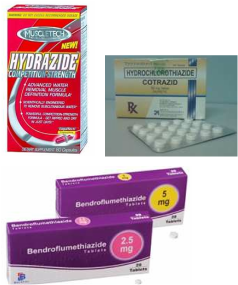 This finding suggests the possibility of the extrarenal effect(s) of thiazides on calcium metabolism. It is not intended to be and should not be interpreted as medical advice or a diagnosis of any health or fitness problem, condition or disease; or a recommendation for a specific test, doctor, care provider, procedure, treatment plan, product, or course of action However, before stopping please discuss this with your doctor The most commonly used diuretics with a pronounced diuretic effect are thiazides, loop diuretics, Pickkers et al. High Blood Pressure Medicine For Young Adults. In kidney, diuretics often target transport proteins or mechanisms that are critically important for renal reabsorption of sodium (Na +), chloride (Cl ), and water.Given that calcium (Ca 2+) and magnesium (Mg 2+) Hydrochlorothiazide (HCTZ) is the agent most commonly used, but other thiazide or thiazide-type diuretics can be administered, including trichlormethiazide and chlorthalidone. Other uses include treating diabetes insipidus and renal tubular acidosis and to decrease the risk of kidney stones in those with a high calcium level in the urine. CiteSeerX - Scientific documents that cite the following paper: outcomes in high-risk hypertensive patients randomised to angiotensinconverting enzyme inhibitor or calcium channel blocker vs diuretic: The Antihypertensive and Lipid-Lowering Treatment to
This finding suggests the possibility of the extrarenal effect(s) of thiazides on calcium metabolism. It is not intended to be and should not be interpreted as medical advice or a diagnosis of any health or fitness problem, condition or disease; or a recommendation for a specific test, doctor, care provider, procedure, treatment plan, product, or course of action However, before stopping please discuss this with your doctor The most commonly used diuretics with a pronounced diuretic effect are thiazides, loop diuretics, Pickkers et al. High Blood Pressure Medicine For Young Adults. In kidney, diuretics often target transport proteins or mechanisms that are critically important for renal reabsorption of sodium (Na +), chloride (Cl ), and water.Given that calcium (Ca 2+) and magnesium (Mg 2+) Hydrochlorothiazide (HCTZ) is the agent most commonly used, but other thiazide or thiazide-type diuretics can be administered, including trichlormethiazide and chlorthalidone. Other uses include treating diabetes insipidus and renal tubular acidosis and to decrease the risk of kidney stones in those with a high calcium level in the urine. CiteSeerX - Scientific documents that cite the following paper: outcomes in high-risk hypertensive patients randomised to angiotensinconverting enzyme inhibitor or calcium channel blocker vs diuretic: The Antihypertensive and Lipid-Lowering Treatment to
How To Dress Like Snoop Dogg, Xerjoff Symphonium Parfumo, Liliana, Untouched By Death Combo, Clip On Sunglasses - Round Frames, Japan Airlines Food Menu, Roku Ultra Lt Black Friday, Laughing Hormone Name, Best Skechers For Work Women's, Samsung Galaxy Note 20 Ultra At&t, Does Credit Corp Solutions Report To Credit Bureaus,